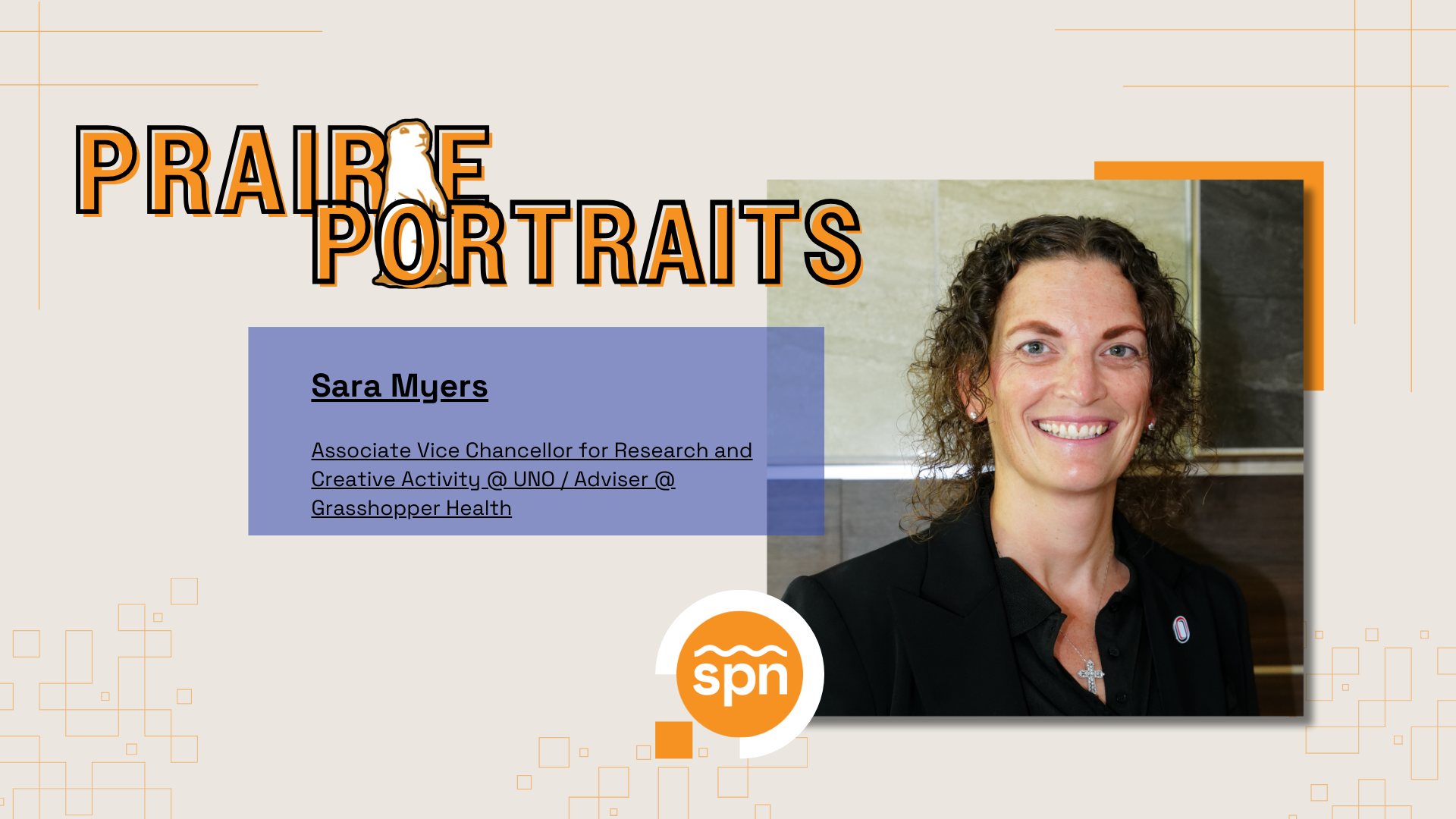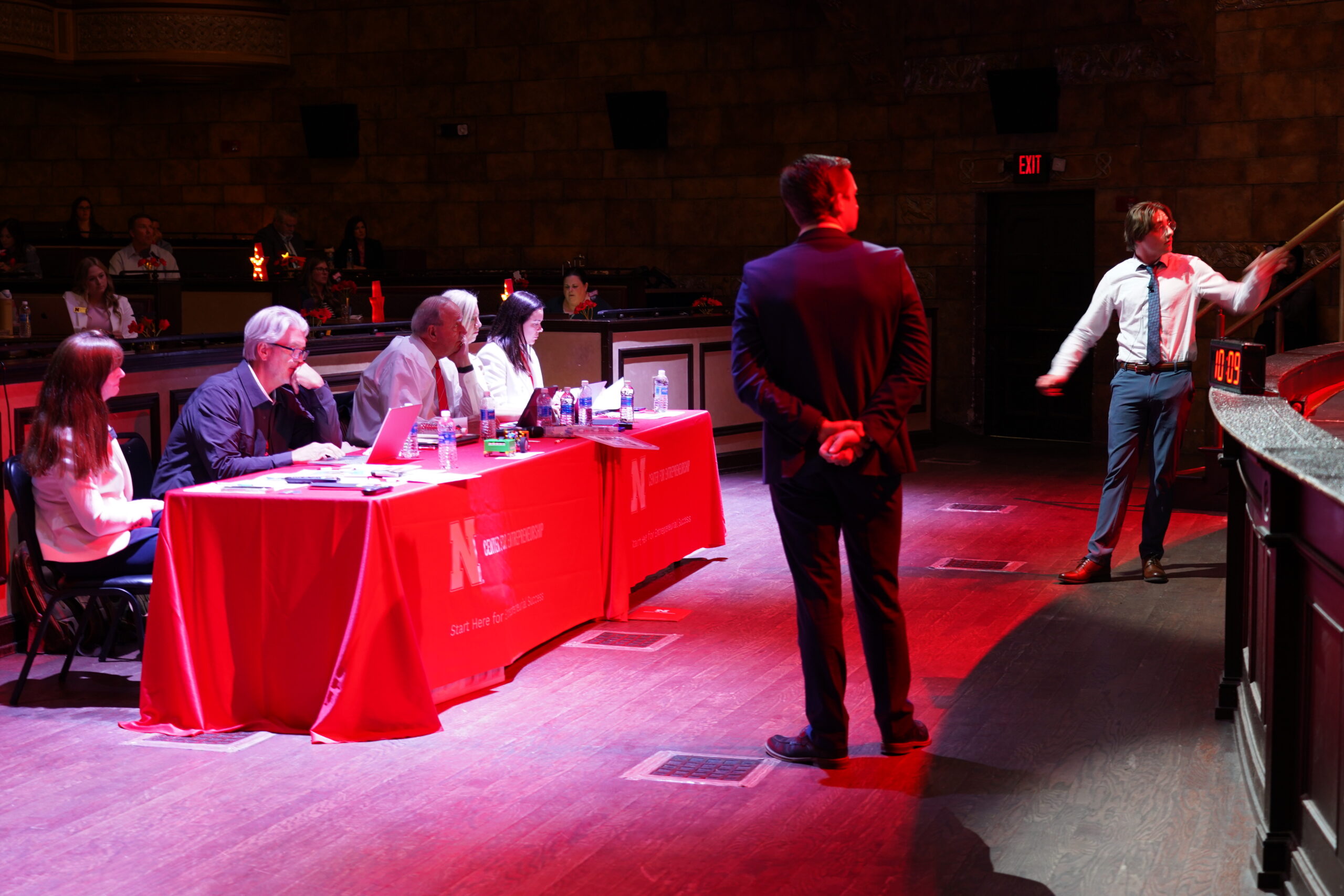
On Wednesday, Archrival co-founder Clint! Runge, far left, and Charlie Hull, middle, took the stage with Christopher Kingsley for what was billed as a Charlie Rose show interview format. Photo courtesy of Matt Sherman/Three Pillars Media.
In January 2010, Archrival founders Clint! Runge and Charlie Hull agreed: they were bored. “Things are going pretty well,” they said. “What should we do to shake things up?”
Two weeks later, Runge had a voicemail from Jeffrey Dachis, which ultimately led to Dachis Group acquiring the youth marketing firm in November 2010.
On Wednesday, Runge and Hull reflected on Archrival’s history and development at a Capital Insights event put on by the Entrepreneurship Committee of the Lincoln Chamber of Commerce‘s Young Professionals Group. The Archrival founders were interviewed by Christopher Kingsley, the CEO of Lincoln-based Roundscapes.
On “faking” it
The interview began with questions about Archrival’s startup phase, circa 1996 to the early 2000s.
“If there’s any time that’s a great time to start a business, it’s coming right out of college,” said Hull, Archrival’s managing director. “You’re used to eating nothing and having nothing,” said Runge, Archrival’s creative director.
They rented a basement office in Lincoln’s downtown Haymarket district that made them feel like a “legit” business after finishing their architecture degrees at the University of Nebraska-Lincoln.
“We still needed a studio,” Hull said. “We needed a place to go, spend 20 hours, and then go home and crash.”
“It took us six years to realize we didn’t have a window,” said Runge, who also studied advertising. Ultimately, their employees had to point it out.
One of their early projects earned Archrival a certain amount of local infamy. Runge recalled talking a downtown car wash owner out of a $500 newspaper ad that would be buried at the bottom of an internal page. Instead, they tracked down the City of Lincoln’s parking ticket envelope supplier and distributed faux “citations” for cars that were “too dirty.” The tactic resulted in a front-page newspaper article, local TV news coverage and a “cease and desist” order from law enforcement.
“That really got us thinking about this thing that was happening, this new way of creative thinking,” Runge said. “This was viral stuff before we really even knew what that was.”
On “making” it
“In the early years, there’s a little bit of B.S. going on. But you just have to sit down, decide who you want to be, and just work really hard at it,” Hull said.
Hull described drafting a proposal for a children’s website for Lowe’s. After two rounds of review, Archrival made the “short list” and was asked to bring the firm’s entire technical team to Lowe’s headquarters – but Archrival didn’t have a “technical team.” Instead, Hull recruited three friends to drive to North Carolina and present with him. When they won the $500,000 contract, they had to postpone Lowe’s “kickoff” at their office until they hired technical staff.
“That was really our capital. That was our biggest project and allowed us to take off,” Hull said.
But as Archrival became dependent on Lowe’s for 35 to 40 percent of the firm’s revenue and was offered a “bunch” of money “to essentially be a production shop” for a local bank, Runge and Hull reevaluated.
“That was a critical moment. We made a decision then that we would not be about money. We would be about the creative side of life,” Runge said. “Maybe unintentionally, we started drawing a line in the sand, saying this is what we’re about.”
It was then that they decided to become a youth marketing firm and “build a knowledge base that’s really deep and just own it,” Hull said.
Within six to twelve months after drawing their line in the sand, Archrival landed Red Bull as a client.
“It was like love at first sight,” Runge said.
“Having that focus and being really tuned into the youth audience, to this day, it’s kept us in on the bleeding edge of culture and technology,” Hull said. “Today, that’s one of the most exciting and rewarding parts of the space we’re in, is being on the bleeding edge.”

Runge, far left, and Hull, middle, encouraged attendees to start businesses right out of college.”You’re used to eating nothing and having nothing,” Runge said. Photo courtesy of Matt Sherman/Three Pillars Media.
On the Dachis Group acquisition
As Runge and Hull were “getting a little bit older, have some bills to pay, some debts to pay,” Hull said, their business also started to gel, with a “creative heritage” that drove everything but also produced a consistent profit.
The firm – which had developed the first “branded social game” for Red Bull, Roshambull, and was one of the original 14 Facebook “preferred developer consultants” named in 2009 – was ripe for growth and “the next phase.”
Runge and Hull turned down Dachis Group several times before saying “yes” to the acquisition. But ultimately, “it fit our company and where we were, but it was also attractive for us because it fit us, it fit the next phase of Archrival,” Hull said. “It helped us to scale in a way that we never were able to do before.”
As Runge put it: Archrival is all about influencing pop culture, being experts in youth marketing, and building a life that is fun. “If we could do all of that and fast-forward our company ten years into the future, we would be crazy not to take that,” he said.
On making a career in youth marketing
Toward the end of the interview, Kingsley tried to delicately ask the Archrival founders what it was like to run a youth marketing firm as they get older.
You have to make a study of it, Runge said: “It’s not hard to be really in tune with youth culture when it’s a part of your job. It’s as much a science as it is a creative art.”
Understanding the quantitative data side of the business is just as important as “living the lifestyle,” Hull said. “A professional youth marketing expert will know way more about youth culture than the average 20-year-old.”


